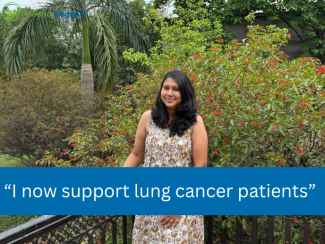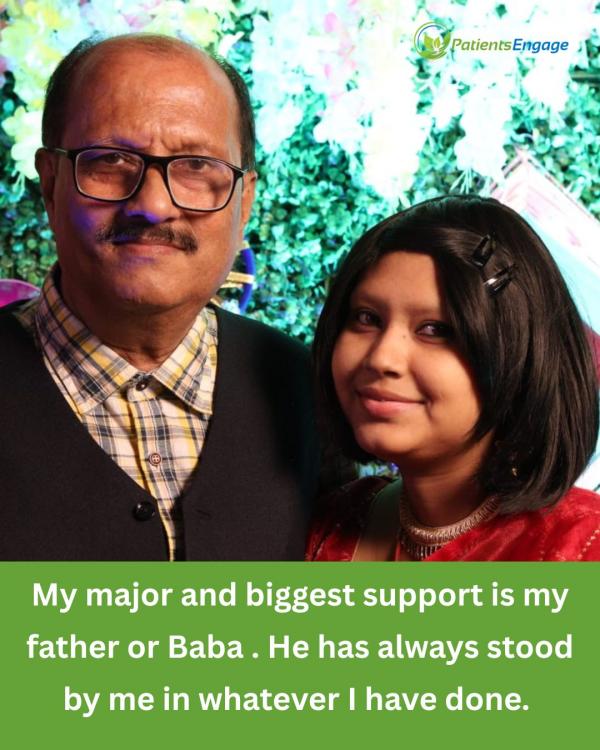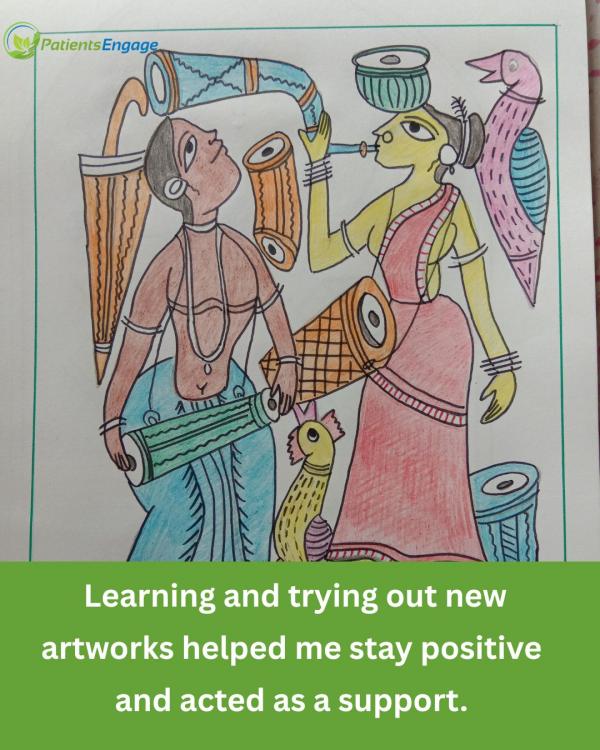
Suchismita Das was an Engineering undergraduate when the diagnosis of a rare soft tissue sarcoma (rhabdomyosarcoma, a rare cancer) in the lung, hit her like a bolt from the blue and turned her world upside down. She fought it out bravely and now she is helping others who going through lung cancer.
I am Suchismita Das, 28 years old, and a rare soft tissue sarcoma survivor. My life was just like any other girl studying engineering till I started facing health issues.
What were your early symptoms?
It all began with the stairs in my college. My classroom was on the third floor, and while others climbed effortlessly, I struggled— pausing after each floor, gasping for breath, my throat turning dry, and my body all drained. I brushed it off as heat or fatigue, but deep down, I knew something wasn’t right.
One day, after rushing up the stairs, I almost collapsed—unable to breathe, water coming right back up while drinking, exhaustion hitting me like never before. That evening, I developed chills and came down with a mild fever, which disappeared by morning, leaving me further confused.
Soon after, a relentless cough took over. It wasn’t mild but a deep, harsh and constant one. Medicines, steam inhalation, and soups didn’t help. During a viva exam, I went into a terrible coughing fit, unable to speak. Everyone stared, and I realized—I couldn’t ignore this anymore. Something was seriously wrong.
What diagnostic tests were done?
I went to a doctor who gave me some medicines, but that did not give me much relief. So, I went to a bigger facility for treatment where they diagnosed that my left lung was receiving less oxygen than my right lung. This was in June 2019. I underwent a CT scan which showed some presence of pleural effusion in the lung. The doctor, on reviewing the report, went for the procedure of draining out the liquid from my lung, following which he suggested a biopsy. Though the liquid tested negative for malignancy, the biopsy report mentioned some round cell tumors. So, the doctor advised us to go to a cancer hospital.
How did the diagnosis come about? Were there challenges in diagnosis?
We went to the Tata Memorial Hospital in Mumbai. The oncologist went through the reports and said it is a rare soft tissue tumor “Rhabdomyosarcoma” in my left lung. The challenges in the diagnosis were more or less the same for every patient—taking time in diagnosis, standing in long queues, not being able to understand where to go exactly, etc. Firstly, they said this was some kind of tuberculosis before the biopsy when the reports were awaiting and asked me to take some medicines for a few days. I took the medicines for around 15 days, but our family doctor at Nagpur had already come to the conclusion on the round cell tumors.
What was your course of treatment?
First, we went to the surgery department, but surgery was ruled out because the cancer had spread, and the oncologists ruled out removing a lung. They sent us to the Medical Oncology department where the doctor said that the treatment will be conducted with curative intent and that the condition requires some intense chemotherapies and radiations. However, in some cases, the chemo does not work. In that case, we will have to think of an alternative plan. But if the chemotherapies work, then just completing the course of the treatment/protocol would be curative. I was given a protocol that alternated cycles of vinCRISTine, DOXOrubicin, CYCLOPHOSPhamide with cycles of IE (iFOSFamide etoposide). Also, 28 radiations were planned in the upcoming days. “This would take almost one year to complete,” he mentioned.
Were there any complications or side effects of treatment?
I was positive in my mind that I will take the chemotherapy and get fit and fine. However, it was not easy. The side effects were adverse and painful. Some common side effects were vomiting, constipation, and fever. In fact, once my blood pressure was so low that I fainted. I lost all my hair after the second chemo. Every time, I looked into the mirror and saw myself bald, I had tears. However, my family and friends always supported me. I saw many people facing the same side effects but still continuing bravely with their treatment. I took some inspiration from them and my journey continued.
Did you try complementary medicine or therapies, like homeopathy or ayurveda? What medications are you currently on?
No, I did not try any ayurvedic or unconventional medicines. I am on remission currently by the grace of God, so I am not taking any medication right now.
Were there any side effects of the treatment? If yes, how did you manage them?
I will always remember the day when I lost my hair. From buying hair accessories to no hair at all—it hurt a lot. I was heartbroken. I started getting some colorful scarves and wigs to hide my bald head. However, it is a temporary stage. Hair comes back in most cases, but it may be of a different texture.
Most days, it was simple food—khichdi, boiled eggs, dal with rice. But honestly, I didn’t feel like eating at all. My appetite had disappeared, and on many days, I couldn’t manage more than a few spoonfuls. The nausea, the metallic taste, the dull ache in my body—everything made food feel like a burden. Still, we pushed through. The side effects after the first chemo were bearable—nausea, weakness, and of course, that constant loss of appetite. Within just a few days, I had lost nearly 4 kilos.
Some side effects like vomiting, nausea, and constipation are sort of bearable because we are already given medicines to deal with them.
I had to drink enough water or liquid to avoid some severe side effects like convulsions. Also, eating food is required, maybe in small portions, but more frequently.
I have faced neutropenia a couple of times and I have been admitted to the hospital also because of that. Also, I was advised with a Filgrastim injection which helps to treat neutropenia but is painful. So my learning was that if a patient has a fever above 99 degrees, he/she should be rushed to the hospital immediately because the reason may be unclear. It may be due to Neutropenia which needs urgent medical help, mostly not possible at home.
Do you have a family history of cancer?
Yes, I lost my mother to GBCa (Gall Bladder Cancer) when I was in Grade 9 in 2013.
Have you learned anything in managing this condition that you wish you knew before?
Yes, here are my takeaways from my own treatment over a year in Mumbai, with only me and my father in terms of family:
- Chemotherapy is painful but temporary—side effects usually last 7-10 days per cycle.
- I wish someone had told me which side effects require urgent medical attention, like fever.
- Drinking 3-4 litres of liquid daily can prevent dehydration and convulsions.
- Side effects worsen with more chemotherapy cycles as immunity declines.
- Homemade food must be extremely simple—non-spicy and with minimal oil.
- Always keep basic medicines like anti-vomiting pills, paracetamol, and laxatives at home.
- Sleeping 16-18 hours post-chemotherapy is normal and helps recovery.
- Constipation, diarrhea, and nausea are common but can be handled with the medications provided by your medical oncologist.
- Watch for signs of low platelets, like unexpected bleeding, and act immediately.
- Keep one or two blood donors ready for emergencies during chemotherapy.
- Don’t hesitate to use a wheelchair or a stretcher if feeling weak, to avoid fainting and falling down.
- Try and stay in accommodations where caregivers can cook simple, fresh food.
You were diagnosed with cancer while studying—how did that impact your social connections, friendships, academic choices, employment, your life choices?
As I was diagnosed with cancer while I was still in my undergraduate college, I could not appear for my semesters as mentioned above and also due to my treatment, I had to take a year’s break. However, Savitribai Phule Pune University and my college were very supportive. My condition recurred while I was in my last year of college, in a milder form. I did not take a gap then and continued with my studies. The institution had lent its full support and I just had to clear my exams. All the internals were managed by them. It hampered my campus placements as I was not in a condition to do a proper corporate job at that time. Then, I found an Ed-Tech startup which was offering a full-time WFH (Work from Home) opportunity. I started working with them as an engineer (backend) and also in the Training Team. I am still working with them. It has been almost around three years now. And also, as I am a cancer survivor, I got an opportunity to work with Lung Connect India Foundation. And, if I talk about friendships, I am really lucky—all my friends stood by me in my tough time. They even visited me occasionally in Mumbai during my treatment to provide me with that much-needed boost.

How would you describe your support system?
My major and biggest support is my father or Baba, as I call him. He has always stood by me in whatever I have done, be it treatment or anything else. Also, my family and friends helped a lot during this tough time. They were always open to conversations and I could share everything with them. They were emotionally available for me when I was vulnerable. I look up to Ms. Vandana Mahajan who has been my counsellor during this journey, and I am inspired by the work she does in the sphere of lung cancer in India. My sincere gratitude to Mr. Sanjeev Sharma, Director of Lung Connect India Foundation too, because he gave me an opportunity to work in a domain where I was new. He believed in me. This has made me a better and more confident person.
Interestingly enough, during this one and a half years of my cancer journey, I have managed to dabble with my hobbies. I was fond of art since childhood but due to lack of time and pressure of studies, I could not focus on it that much. I utilized this time learning new artworks and trying them out. This diversion also helped me stay positive and acted as a support.

What were some of the lifestyle changes you have had to make?
I have not gone through major lifestyle changes, but I have started exercising daily around 45 minutes to 1 hour. I have also made a few changes in my food habits. I have reduced eating out as well as the consumption of sweets. I try to eat normal home cooked food as much as possible.
How do you contribute at Lung Connect? What have you learned?
I am working at Lung Connect India Foundation for the last two years as an Associate Communication Manager. We are a unique Lung Cancer Patient Support and Advocacy Group. By providing comprehensive educational resources, we aim to empower patients and their families with the information they need to make informed decisions about their health and treatment options. Our advocacy efforts focus on raising awareness, influencing policy changes, and ensuring that lung cancer patients receive the best possible care and support.
I have learned a lot of things from this organization both personally and professionally. As a Communication manager, I got the opportunity to explore the power of social media and graphic designing. I also understood the role of social media and its impact on those struggling with a difficult illness like lung cancer. Personally, by interacting with others who have been through a similar journey, I have become more compassionate towards the struggles of others. I have learned resilience and the importance of living in the NOW.
What is your advice to patients who face similar challenges?
Cancer as a condition is an exacting one, and it is not always possible to remain positive. Cancer not only affects the patients themselves but also their immediate families. But do not lose hope because medical science has seen tremendous progress and there is huge improvement in cancer treatment now. It is also important to join a support group so that you get to meet patients who have similar challenges and it is always a learning experience to see how each one handles his/her issues.
What are you worried about for the future?
I believe in destiny and the importance of gratitude. I am grateful to everyone that I am living well now. But there’s always a chance of recurrence and I suffer from "scanxiety" (anxiety before a scan) every 6 months. I am also not very sure what the future holds for me in terms of marriage. I want to grow in my career and help people as much as possible from my end. I want to work for people living with lung cancer and the financial toxicity in cancer care. Earlier there were fewer medicines. But now, medicines are available but many people who I have come across cannot afford them. Also, awareness about early diagnosis is very important because more than 80% of patients are diagnosed late in lung cancer, limiting treatment options.






